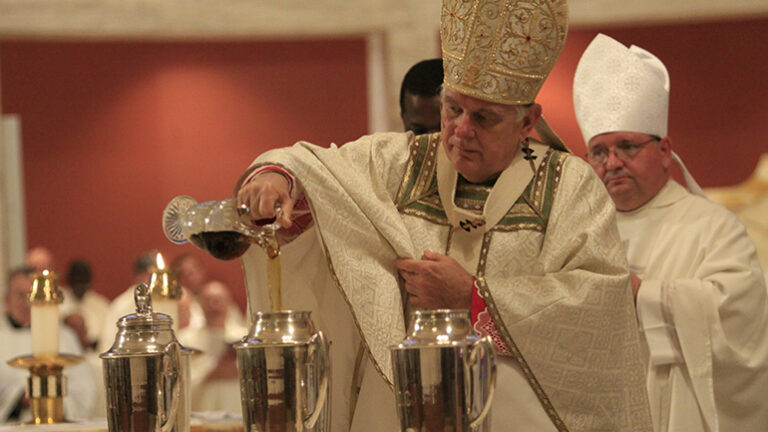As this year’s Chrism Mass draws closer, it becomes pertinent to revisit the use and abuse of oils in the Church today. That we see variations in the categories of oils we’ve got today in the Church is a matter of sincere concern.
Canonically speaking, there are three kinds of oils in the Catholic Church, blessed (or/and consecrated) by the Bishop at Chrism Mass every year, and sent to all parishes for the spiritual good of the people of God – these include, oil of Chrism, oil of catechumen, and oil of the sick. These oils are used within the context of the celebration of the Sacraments of either Holy Order, Anointing of the Sick, Baptism, or Confirmation. It is sad that today, we now have a multiplicity of these oils in connection with Anointing of the sick, such as “back to sender oil”, “saint Michael oil or perfume”, “Goya oil”, “Oku nerere oil (burning fire oil),” “touch and follow oil” “Holy Ghost action” and the likes.
Ignorantly, the lay faithful purchase these oils and have them “blessed” by their priests. One thing they do not know is that most of these oils are locally made from unknown sources, and some “spirits” conjured upon them for certain unhealthy purposes; then they are sold at the Church’s gate or brought into the Church and taken to the priest for blessing. Sad, isn’t it? Sadder is even the case when some priests make their own branded oils, bless them and sell these at their adoration grounds for the faithful to take home and use. Many of them do this also to make profits out of these – an oil that ordinarily goes for 200 naira suddenly becomes 2000 naira after blessing. Have we forgotten the words of Christ: “you received without charge, give without charge”? (Mat. 10:8).
Dear friends, of these variations in the different kinds of oils, the Church has not approved, neither are priests permitted to bless oils for the faithful unless in cases of grave necessity. Put differently, of these three oils (Chrism, catechumen, and the sick), only in the case of the oil of the sick is there foreseen the possibility of another oil being used and of the priest’s blessing the oil in case of emergency, and this must be done while celebrating the sacrament of anointing of the sick alone. Pope Paul VI brought about this possibility in the 1972 apostolic constitution “Sacram Unctione Infirmorum.” He permitted that priests could bless this oil in case of emergency. This norm was later incorporated into Canon 999 of the Code of Canon Law which determines who may bless the oil:
“In addition to a bishop, the following can bless the oil to be used in the anointing of the sick: 1) those equivalent to a diocesan bishop by law; 2) any presbyter in a case of necessity, but only in the actual celebration of the sacrament.” (emphasis, mine). Going deeper, Canon 847 §2, states: “The pastor is to obtain the holy oils from his own bishop and is to preserve them diligently with proper care.” This explains that the oils are not even to be in the possession of the lay faithful but in the possession of the Bishop who blesses them and sends them to parishes for Pastoral use. Having blessed this oil at Chrism Mass, the Canon Law states succinctly that the one who administers it is a priest, NOT even a deacon or the lay faithful – Canon 1003 §1 on the Minister of the Anointing of the sick, states clearly: “Every priest, but only a priest, can validly administer the Anointing of the sick.”
Therefore, the next time you think of taking your bottle of oil to the Priest to bless, please think twice!
Unfortunately, what do we see today? Some Catholic Priests do bless any type of oil, left and right, outside the Sacrament of the anointing of the Sick and they call it anointing oils for the sick…name it! Some bless them during crusade or adoration to drive out demons…, and sell to their followers to take home. Now, when these oils are given to the laity to use, this already implies a go-ahead to anoint oneself, which shouldn’t be the case. Biblically speaking, it takes a mandated person to anoint another person; in other words, no one anoints the self, scripturally. But today, a person being in possession of any oil would anoint his/herself and even go to the extent of drinking these oils, thereby endangering oneself to health issues.
Dear friends, as far as the Church’s Magisterium is concerned, there are no bases or support for these aberrations. When you travel out of Nigeria, you would discover the difference – the people of God over here do not buy these oils to use. I’ve never seen a single request to bless oils over here, but have seen many in Nigeria. During my last holiday in Lagos, many persons brought “back to sender” oil (and the likes) for me to bless and I was alarmed, asking and wondering how the idea of “back to sender” fits in Sacred Scripture (to begin with). Even Christ taught his disciples never to retaliate when the Samaritans were hostile to them (cf. Lk. 9:54-55). It is despondent that many have derailed and are acting anti-Scriptural. Now, how would the blessing of Christ be imparted into such oil that calls itself “back to sender”? In fact, any kind of oil that is outside “Oil of Chrism”, Oil of the sick”, and oil of Catechumen” (for use in the Church), should be kindly put aside or be disposed of. This is not a matter of “it works for me”. This idea that “it works for me” should also be thrown away. Nothing works for you aside from your faith in Christ Jesus. It is your faith working for you and not the oil. For Christ to act in you, your faith is a prerequisite. This explains why Christ couldn’t work miracles in his hometown because of their lack of faith (cf. Matthew 13:58). If you need an element that should work for you alongside your faith, then get water and salt and take it to the priest for blessing! The traditional rite of exorcism (blessing) of water and salt (as scripture reveals) illustrates the power of God imparted into these elements to drive out evil spirits, restore health, purify, heal, etc. If only the power of Holy water is recognized, our people would always be in possession of it; sadly, they prefer the “kabashing” kind of oil.
Already, some dioceses in Nigeria have placed bans on any kind of oil for use by the faithful aside from the three oils used by the Church (Chrism, Catechumen, and the Sick). Personally, it took me am ample time and patience to convince my mom to get rid of the oils she had with her in our home. I couldn’t do that as a seminarian or deacon, for she wouldn’t have believed me and may even question my knowledge as to why some priests do it; rather, I waited until I became a priest, and immediately I did the needful. Even as a priest, she was reluctant to get rid of the goya oils she had with her, but eventually had to do it because her priest-son asked her to do that.
I recall that I preached against this oil issue in a certain parish during my last holiday in Nigeria, reminding them how they were anointed priests, kings, and prophets at baptism and confirmation with the holy oils of Chrism and oil of catechumen; and that they did not need any extra kinds of foreign oils for their spiritual well-being. After that Mass, the people came around me with utmost surprise inquiring to know more about the “new teaching” on oils, which apparently wasn’t new.
Above all, I do not pose myself as an encyclopedia of knowledge, for what I have explained in this piece springs from the Church’s magisterium. I’m open to further discussion on this matter for anyone who feels that the Church has permitted the use of these foreign oils discussed above to be used by the laity, be it for “inculturation purpose” or local custom, as they often argue – I will like to read the Church’s document that approves such; for the Church cannot say something somewhere and still go ahead and contradict herself elsewhere.
Shalom!
Fr. Chinaka Justin Mbaeri, OSJ
nozickcjoe@gmail.com / fadacjay@gmail.com
___________________________________
PS: Have you prayed your Rosary today?





Interesting article. Thank you Fr and keep enriching us over here as these things are getting out of hand. Some bring the special oil to harvest day and asked those looking for the fruit of the womb to come out 250k to support the harvest and obtain the miracle oil. May God help us. Amen.
Thanks Fr.Chinaka was this wonderful and eye opening teaching.
Surprisingly as you noted,a lot of our clergy are into this practice,and that’s why the lay faithful is being deceived.
I think our bishops will have to take a stand on some of these issues just like this one,so that some normalcy can be restored in the abuses been witnessed in the use of these oils both in parishes and our homes.
Thanks for the good work once again.